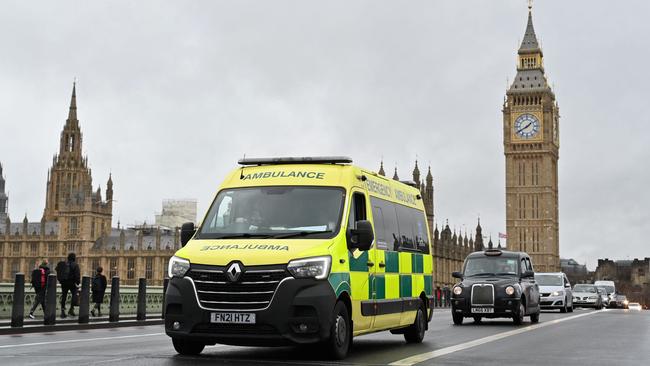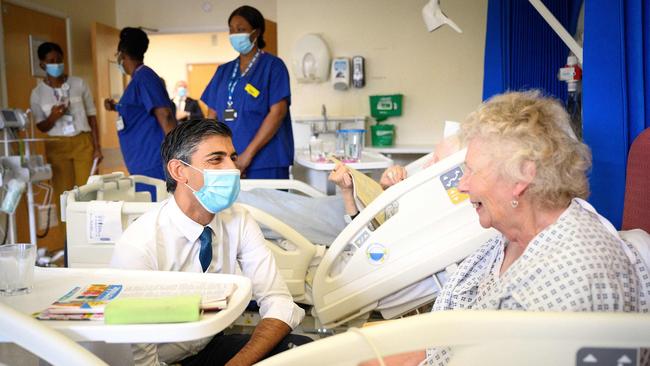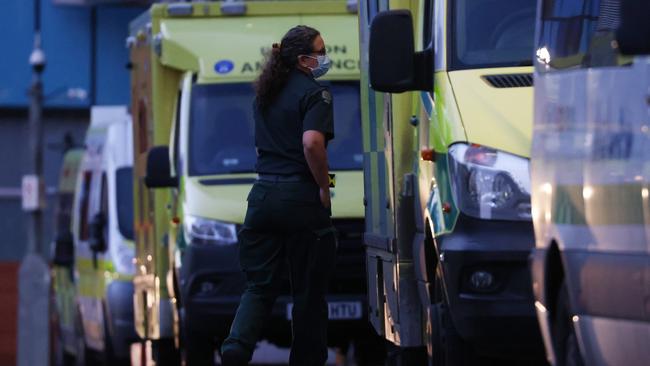Lessons for Australia as Britain’s NHS creaks under strain

Unfortunately an accident on day one of the trip where my 92-year-old father fell and knocked his head up-ended the best laid plans.
The catastrophe did, however, provide a ringside seat to the crisis playing out in British healthcare. And just like energy transition, Britain offers valuable lessons for Australia as the Albanese government ponders its response to the runaway costs of NDIS and an aged care system still not fit for purpose.
During what turned out to be a full day in A&E, my father became what is known as a “bed blocker”. He was fit to leave but for seven hours was unable to do so until head and neck scan results were returned (mercifully all good). In the meantime incoming emergency patients overflowed into the corridor for treatment due to lack of beds.

Last week fresh monthly numbers on the NHS crisis revealed a shocking state of affairs across the nation. Heart attack and stroke patients on average had to wait more than an hour and half for an ambulance in December. Doctors warn that delays are killing hundreds every week.
About 800,000 patients who turned up at A&E waited over four hours to be seen and over 54,000 patients spent more than 12 hours in corridors because of lack of beds, up over four times the number from a year ago. Corridor care is now part of the system.
NHS England has more than 130,000 job vacancies and the UK papers bemoan the young doctors heading for better pay and conditions in Australia.
At the 2012 Olympic Games Opening Ceremony in Britain, the NHS was paraded as a national treasure, the envy of the world. Ten years on the system needs a massive makeover. Yet even worse than Medicare, it has become a political football far too hot to reform.
The extent of political sensitivity was exposed when the well-heeled British Prime Minister Rishi Sunak was asked if he used private healthcare. He declined to say, arguing it was not really relevant. After days of follow up grilling by media he finally clarified to parliament that he was in fact registered with an NHS GP.
As The Times leader rightly pointed out, the PM had no reason to be embarrassed for choosing to use private healthcare. After all, he is a free choice Conservative and has lived in the US. “The toast dropping reply would have been in the negative,” observed The Times. Yet cost-of-living pressures in the UK and a badgering Opposition leader, with a wife and mother who both worked in the NHS, clearly made such a confession uncomfortable.
Thankfully in Australia there is still the belief that if you can afford to go private, this is the right thing to do, not least because it takes some of the burden off the public system.
Health policy in countries like UK and Australia which offer universal healthcare are fiendishly complicated and direct comparisons can be unwise. In part, both suffer from what former UK Health Minister Enoch Powell in the 1960s identified as the public’s infinite capacity for free health offered at the point of consumption.
Fundamentally the NHS is suffering badly from a lack of reform, from basic infrastructure and IT to its treatment of staff. While the NHS itself has been mostly immune from “austerity” cuts, the two systems which impact the hospital system directly have been underfunded: the primary care system of GPs and the social care system that supports particularly aged care patients post-hospital. This puts yet more pressure on hospitals and their A&E departments.
Even Labour leader Sir Keir Starmer believes the NHS needs tough reform. Writing in The Telegraph on Saturday Starmer says the NHS is no longer the envy of the world. He calls for a restructure in primary care that would include self-referrals to bypass GPs for services like physio. More controversially, he would like to replace the partnership model of GPs with direct employment.

Starmer’s critics say the policy would lead to mass early retirement by GPs and only exacerbate the problem. Yet bold reforms are being called for by commentators across mastheads.
Today the UK government is funding beds in hotels and extra capacity in private hospitals to alleviate the blocked bed situation in A&E. It is crossing fingers that the flu season has peaked, Covid is under control and the system will return to “normal” levels of stress.
This week NHS nurses go on strike in what has been a horror winter of rolling industrial action for the UK across transport, border force, health, the post office and the civil service.
As the cost of living bites, unions have masterfully staggered worker strikes within sectors. This minimises forgone wages for individuals but because each striking unit is critical for the running of the service, the effect is to inflict maximum ongoing paralysis at the expense of the public. It is a new level of sophistication which Australian unions are no doubt watching carefully.
The serious message for Australia is around spiralling costs and the need to manage public expectation of what a health service, free at the point of consumption, can withstand. And the critical importance of a robust aged care sector that can avoid a bed blocking nightmare.
In the UK mental health falls within the purview of the NHS. Australia has introduced a new model in the NDIS which puts mental health together with disability in a so far uncapped program. The May budget will reveal just how far this government is prepared to go to address the massive blowout in NDIS spending.



Whatever happens, do not find yourself at Accident and Emergency in a British hospital. This was the crisp advice given to me ahead of a brief trip to the UK this month.